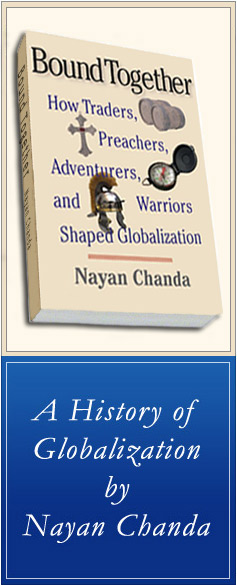Bound Together, By Nayan Chanda
Two cheers for globalisation
—Salil Tripathi
That's the human aspect of globalisation, as Nayan Chanda's gently-paced history reminds us. His book about "how traders, preachers, adventurers and warriors shaped globalisation" is essentially a human drama, about people travelling across cultures, leaving civilisations, finding new homes, and creating new lives by blending with other people. Yet this drama has unfortunately been hijacked by the Manichean debate over how economies can develop.
Since the fall of the Berlin Wall, on the one hand, most companies and governments propagate the virtues of the seamless markets promised by borderlessness, suggesting with help from enthusiastic cheerleaders like Tom Friedman of the New York Times that prosperity is on the horizon for all and that a rising tide lifts everyone.
On the other hand are the weak, who see in that rising tide a tsunami. They are supported by globalisation's naysayers, who see in the G-word a vast right-wing conspiracy to take away the sovereignty of nations. From the failed World Trade Organisation summit in Seattle in 1999 onwards, globalisation has attracted more than a fair share of critics, from supposed intellectual heavyweights like Joseph Stiglitz to populist polemicists like Naomi Klein.
This cacophonous debate, Chanda says, is pointless. Unlike its critics' claims, nobody is in charge of globalisation, a process as natural as breathing driven by "the basic motivations that propelled humans to connect with others - the urge to profit by trading, the drive to spread religious belief, the desire to exploit new lands and the ambition to dominate others by armed might". This is a human endeavour, and restricting it, as Amartya Sen argued in the context of international trade, would be like restricting conversation among people.
Chanda knows his subject well, and has combined a reporter's curiosity and power of observation with the academic rigour of a scholar to produce a calm volume that should offer a reality-check to the partisans. As director of the publications programme of the Yale Center for the Study of Globalization, he publishes an engaging online magazine on the subject. Furthermore, he has had a three-decade innings at the Hong Kong-based Far Eastern Economic Review (disclosure: where he was my editor). There, Chanda witnessed Asia's rise and its economic crisis of 1997-98, when the poster-child of globalisation had become its victim.
Chanda divides his stories in four parts. "Traders" deals with the human urge to seek out new territories and markets, and Chanda links traders on the old silk route with the likes of Steve Jobs of Apple, who combine efficiencies around the world to ensure that the right product reaches the right market at the right price at the right time. Some of what he writes such as how an iPod makes its journey from a plant in Shanghai to his home in New Haven has been told before in other forms. Milton Friedman wrote about how the humble pencil shows our interconnectedness.
In the second part, "Preachers", Chanda compares today's NGOs his focus is Human Rights Watch with missionaries of another era, who spread a message of universal values to influence public opinion and change the world. As many NGO staff think of themselves as non-religious, senior executives at HRW are not comfortable with that comparison; but the point, while not novel, is a valid one. "Adventurers" looks at explorers, as Chanda follows travellers whose accounts have enriched our understanding of different cultures. In the final part, "Warriors", he deals with the armies that went to colonise, subjugate and convert people, leading to the colonial period.
The neat categorisation is helpful, but it is the intermingled nature of globalisation that shows how the four strands connect. Trade and flag often followed each other, and the Bible and the rifle too went hand-in-hand. If there is a fundamental difference today, it is that gunboats are not deployed to open markets and, political rhetoric about crusades and jihads apart, few nation-states invoke the faith to launch a war. It is in dealing with the colonial project that Chanda could have stopped being a reporter and taken a stance more firmly in criticising adventurism. Drawing a few lines in the sand would have allowed him to attract a wider readership that remains sceptical of globalisation.
Globalisation has suffered too long from being seen as a mercantilist endeavour to benefit multinationals. Chanda documents the history of the past two millennia by casting light, not heat, on little-known facts and apparently unconnected trends to show how we are bound together. There is irony in the slogan, "anti-globalisers of the world unite". Chanda sees it, and shows us how ahistorical that nativist urge is. Partisans on both sides can learn much from his book. But as it is neither a bite-sized presentation, nor a polemical invective, the pity is that those at the fringes of the debate will not. That's their loss; for the many of us in the middle, Chanda portrays the complexities and that, in itself, is an important task.
—Salil Tripathi is a writer at The Independent.
